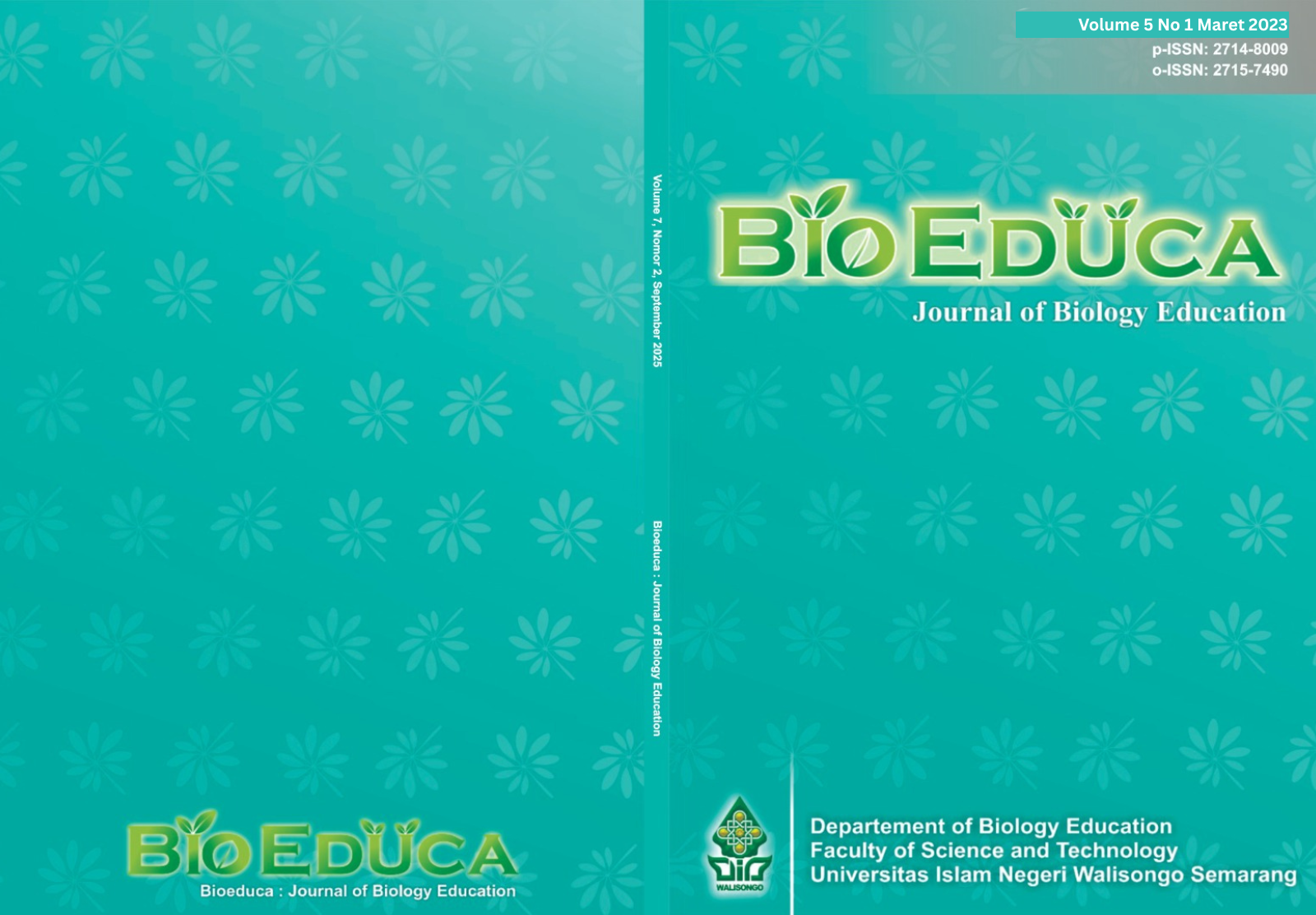The Effect of the Double Loop Problem Solving Model on Problem Solving Ability and Critical Thinking Skills
Main Article Content
Abstract
Downloads
Article Details
The copyright of the received article shall be assigned to the journal as the publisher of the journal. The intended copyright includes the right to publish the article in various forms (including reprints). The journal maintains the publishing rights to the published articles. Authors are allowed to use their articles for any legal purposes deemed necessary without written permission from the journal with an acknowledgment of initial publication to this journal.

This work is licensed under a Creative Commons Attribution-ShareAlike 4.0 International License.
References
Ahied, M., & Rosidi, I. (2020). Penerapan Model Pembelajaran Double Loop Problem Solving ( DLPS ) Terhadap Kemampuan Pemecahan Masalah. Jurnal Lumious Riset Ilmiaah Pendidikan Fisika, 1(1), 8–19. https://doi.org/10.31851/luminous.v1i1.3442
Alwi., Gani, T., & Danial, M. (2019). Pengembangan Strategi Pembelajaran Berbasis Masalah Untuk Meningkatkan Keterampilan Berpikir Kritis Dan Kemampuan Pemecahan Masalah Peserta Didik. Chemistry Education Review (CER), 2(2), 111. https://doi.org/10.26858/cer.v2i2.8966
Ennis, R. H. (1985). A Logical Basis For Measuring Critical Thinking Skills. Educational Leadership, 44–48. https://pdfs.semanticscholar.org/80a7/c7d4a98987590751df4b1bd9adf747fd 7aaa.pdf
Fatmala, R.., Dwijananti, P., & Astuti, B. (2016). Penerapan Model Double Loop Problem Solving Menggunakan Detektor Geiger Muller untuk Meningkatkan Hasil Belajar Kognitif. Unnes Science Education Journal, 5(3), 1388–1395.
Fithriyah, I., Sadijah, C., & Sisworo. (2016). Analisis keterampilan berpikir kritis siswa kelas IX SMPN 17 Malang. Jurnal Konferensi Nasional Penelitian Matematika dan Pembelajarannya, 3(2), 580-590.
Himmatussolihah, Ashadi, & Elfi Susanti, V. H. (2020). Critical Thinking Skills of 10th Grade Students and the Effect on Learning Achievement. Advances in Social Science, Education and Humanities Research, 397(Icliqe 2019), 953–
Jufri, L. H. (2015). Penerapan Double Loop Problem Solving untuk Meningkatkan Kemampuan Literasi Matematis Level 3 pada Siswa Kelas VIII SMPN 27 Bandung. LEMMA Pendidikan Matematika, II(1), 52–62.
Mas’ad, M., Nizaar, M., & Putra, A. M. (2018). Pengaruh Metode Pembelajaran Double Loop Problem Solving(DLPS) Terhadap Hasil Belajar Ips Siswa Kelas VIII Smp Negeri 3 Mataram Tahun Pelajaran 2015-2016. Paedagoria | FKIP UMMat, 7(2), 73. https://doi.org/10.31764/paedagoria.v7i2.33
Permana, I., Zulhijatiningsih, Z., & Kurniasih, S. (2021). Efektivitas E-Modul Sistem Pencernaan Berbasis Problem Solving Terhadap Kemampuan Pemecahan Masalah. Jurnal IPA & Pembelajaran IPA, 5(1), 36–47. https://doi.org/10.24815/jipi.v5i1.18372
Pradipta, S.G. (2016). Penerapan Model Pembelajaran DLPS (Double Loop Problem Solving) untuk Meningkatkan Pemahaman Konsep Pengaruh Perubahan Lingkungan Fisik Terhadap Daratan. Jurnal Didaktika Dwija Indria, 4 (10).
Pratama, O. I., & Suherman, S. (2018). Pembelajaran Double Loop Problem Solving Terhadap Kemampuan Pemecahan Masalah Matematis. Desimal: Jurnal Matematika, 1(3), 285–291. https://doi.org/10.24042/djm.v1i3.2661
Redhana, I. W. (2019). Mengembangkan Keterampilan Abad Ke-21 Dalam Pembelajaran Kimia. Jurnal Inovasi Pendidikan Kimia, 13(1).
Safitri, J. A., & Zen, D. (2018). Pengaruh Model Pembelajaran Double Loop Problem Solving ( DLPS ) Terhadap Hasil Belajar Ranah Kognitif Peserta Didik pada Materi Keanekaragaman Hayati. Jurnal Penelitian Pendidikan Biologi, 2, 41–47
Shoimin, (2014). Model-model Pembelajaran Berwawasan Lingkungan Hidup. Yogyakarta: Ar-ruzz Media
Silva A.I.P., Sunarno. W., & Harlita. (2021) Studi Literatur Double Loop Problem Solving (DLPS) Terhadap Kemampuan Pemecahan Masalah IPA siswa SMP. INKUIRI: Jurnal Pendidikan IPA 10 (2), 108 – 116. https://doi.org/10.20961/inkuiri.v10i2.57253
Tawil, M., & Liliasari. (2013). Berpikir Kompleks dan Implementasinya dalam Pembelajaran IPA. Badan Penerbit UNM:Makassar
Umiyaroh, F., & Handoyo, B. (2017). The Influence of Double Loop Problem Solving Learning Models to Senior High School Learners Spatial Thinking Ability. International Interdisciplinary Journal of Scholarly Research (IIJSR), 3(1), 27–35. https://www.srpublishers.org/uploads/4/3/6/9/43696183/003-006-0017-iijsr.pdf
Urbach, A. A. (2021). Pengaruh Model Pembelajaran Double Loop Problem Solving (Dlps) Terhadap Kemampuan Berpikir Kritis Dan Kemandirian Belajar Peserta Didik Pada Mata Pelajaran Biologi Di Ma Al-Ikhlas Sumatera Selatan.
Utami, M. F. L. B. (2017). Penerapan Strategi Discovery Learning (DL) Untuk Meningkatkan Keterampilan Berpikir Kritis dan Pemahaman Konsep IPA. JINoP (Jurnal Inovasi Pembelajaran), 3(1), 483–490. http://202.52.52.22/index.php/jinop/article/view/4317
Yuliana, Y., Ismail, I., & Rispawati, R. (2015). Pengaruh Model Double Loop Problem Solving terhadap Kemampuan Berpikir Kritis Siswa Kelas X pada Mata Pelajaran PPKn. Jurnal Pendidikan Sosial Keberagaman, 5(2). https://doi.org/10.29303/juridiksiam.v5i2.64

